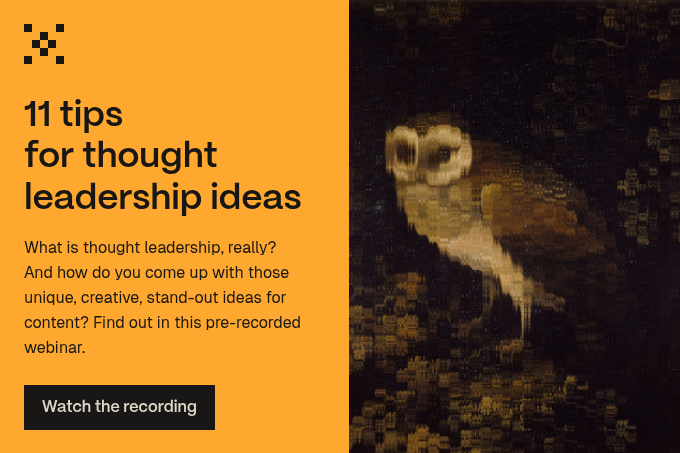Podcasts are receiving a resurgence of attention from both consumers and marketing agencies. Should you be using podcasts as content in your marketing strategy?
Podcasts, like these six excellent podcasts for writers, have been around for over a decade, but, in the past few years, come sharply into focus for marketers.
- In mid-2013, Apple’s iTunes podcast subscriptions reached 1 billion
- According to Edison Research (PDF), as of 2014, a steady increase in podcast listeners led to 39 million Americans having listened to a podcast in the past month and one in five podcast users consuming six or more per week
- Last year, the viral podcast Serial had an average of 3.4 million downloads per episode provoking the public’s (and marketing’s) attention to podcasts as a medium
This moment in the limelight begs questions about why podcasts are gaining popularity, what that means to marketers, what it takes to produce a podcast feed and whether or not it’s right for your brand.
Podcasts as content
If you’re wondering if the podcast bandwagon is worth jumping on, it’s important to understand why this form of audio content is now being considered mainstream. Its steadily rising popularity is because:
- People are more accustomed to consuming media in transit. Time in cars, planes and trains means they have time for long-form content.
- Podcasts are easier to create, requiring much less technical ability now than they did ten years ago.
- Podcasts are easier to access. They can be downloaded and listened to from a smart phone.
- The content is on-demand. It’s consumed the same way movies are on Netflix.
- Podcasts are better quality with budgets, producers and talent creating niche content.
A podcast may be a type of content, but how does a podcast feed fit into a marketing strategy alongside blog articles, social posts and email marketing? Well, done right, it can also:
- Attract the ideal buyer based on niche themes
- Create awareness for your brand by creating a community of listeners
- Establish your authority in the industry by discussing relevant topics
- Delight customers into brand advocates with entertaining content
How are these things achieved through a podcast, though? What does it take to make a brand-building podcast?
Creating a proper podcast feed for a content strategy
As with any type of content marketing, it’s quality, not quantity which captures and maintains the buyer's attention. Quality content in a podcast series comes from:
1. Focusing on a single buyer persona
While it might be tempting to appeal to every type of buyer your brand attracts, it’s essential to choose just one buyer persona to base the theme of your podcast on. The success of a podcast depends on finding a niche audience, so you must have a singular focus from the start.
2. A title and cover art
The title and image for your feed play into the branding of your podcast. Think of the title of your feed and of each episode:
- First, by what your audience would search for when looking for a new feed to subscribe to
- Second, like the subject line of an email. It needs to indicate what the podcast is about, but also be clickable
In addition, you need to create an image to serve as the cover art for your feed and each episode. This helps people recognise the podcast as part of your brand on your hosting site and on iTunes.
3. Dynamic host or hosts
Podcast content is on demand and there is plenty available, so no one will willingly choose to listen to an annoying or boring host for a half hour stretch and then subscribe to the feed for more torture.
Think of how people scan a blog to decide if your page is worth staying on. Instead of headings and whitespace, the voice behind your podcast will determine if people stay and subscribe or bounce to the next feed in the same niche so take care in who speaks and how they speak.
4. Interesting, targeted topics
Generating topics for podcast episodes happens much the way you generate blog ideas. You should always:
- Base ideas on the interests and pain points of the buyer persona and industry
- Offer information which is educational, inspirational, motivational or entertaining
- Avoid ‘selling’ your product or service
A podcast is not a long commercial. With every episode, you build your brand up as you offer content which has value to the listener.
5. Structure
Your podcast needs to have structure, but it also should sound conversational, not rehearsed. So, how do you strike the balance between planned and spontaneous?
- Format. You can do a solo, multi-host or interview format. You also need to decide the typical length of each podcast and how often you will publish an episode.
- Outline. You need to decide the flow of each podcast. Will you have an introduction? Will there be theme music? (Make sure to heed licenses). How will you incorporate any sponsor breaks? Much like a morning talk show has a pattern, you’ll want an internal structure to guide you.
- Script. You want the dialogue of each podcast to sound conversational. However, it’s a good idea to have a script which helps you get off to a strong start, introduces the topic or guest speaker well, outlines your main talking points, helps you come back from tangents and covers everything you plan to.
For marketers, the energy which goes into the creative side of producing a podcast feed probably sounds familiar, manageable and even fun. However, like all online marketing, you also have to consider more than the creative aspect to decide if a podcast is the right kind of content for your brand.
The research required
If you started blogging as a newbie to WordPress or recently tackled an integrated marketing tool like HubSpot, you’re no stranger to the fact that online marketing requires not just creative planning, but also a bit of technical knowledge to execute. Before you can start a podcast, you need to ask questions like:
What equipment do I need?
Part of the reason for podcasts’ resurgence is how easy it is to create an audio file. Some feeds might be recorded in state-of-the-art studios, but, in reality, all you need is a microphone and computer. You can search online for what seasoned podcasters use and how they use it.
Do I need any extra software to create a podcast?
If you’re committed to creating a quality podcast, you’ll want to edit out awkward pauses, interruptions in calls with guests, rambling or other unneeded portions. You could look into free recording and editing software like Audacity as a starting point and consider what others are using.
Where does my feed live?
You have options as to where your podcast lives. WordPress has a plugin which allows for distribution through a blog. There are also paid podcasting services available like Buzzsprout.
You’ll want to consider the support, bandwidth and amount of storage you will need for your podcast feed. These things determine if your podcast broadcasts or buffers.
How do I attract and maintain an audience?
RSS feeds allow your listeners to subscribe to your feed and receive updates. A lot of listeners use iTunes as a way to consume podcasts so once you have created your podcast and posted them online, you’ll want to submit them to iTunes so people can find them.
What does it cost and who pays for it?
A podcast can be relatively inexpensive to create. However, you do have to consider the time you devote to planning and creating.
While podcasts subscriptions are typically free to the listener, podcasts can generate revenue through:
- Affiliate marketing, sponsors and ads relevant to your topic and industry
- Donations and crowdfunding
- Charge for extra content or partial episodes
Do not discount that a podcast feed is a strong branding tool for building both awareness for and authority into your brand so not all gains will be strictly monetary.
Can I track the reach and return of my podcast?
Because you are creating your podcast for one specific persona, the number of subscriptions or downloads will not necessarily speak to its success. Additionally, the number of downloads might not represent the number of engaged listeners.
iTunes doesn’t have a built-in analytics tool to track engagement or track a lead to your site, but some podcasters do use Google Analytics and other tools to gauge their feed’s reach.
Measuring the reach of podcasts represents one of the biggest challenges of using this form of content for your marketing. Before you begin, you need to research and decide how to determine if your podcast is pulling its weight.
Once you’ve looked into both the creative side and logistics of creating a podcast, the big question remains: is it worth your time and marketing resources?
Are podcasts right for my brand and content strategy?
In the end, podcasts are another way to reach potential customers and build up your current community through content. It’s up to you to determine if it is right for your brand. Ask yourself:
- Are my ideal buyers listening to podcasts?
- Are there other successful podcasts in my industry or would I be the first?
- Do I have time to devote to creating a quality podcast?
- Could I create a community around it?
Whether the popularity of podcasts wanes or grows will most likely depend on the consumer’s ability to find content relevant to them.
If your brand can create audio content which suits a specific need in an entertaining way, your company might just find podcasts to be a new and different way to reach those leads and customers you work day in and day out to attract and retain.
(Hat tip to Patrick Breitenbach, Alosh Bennett and Sharday for the photos)
.jpg?width=1600&height=800&name=europeana-DfBSs2SSNwQ-unsplash%20(1).jpg)




-1.jpg?width=400&height=250&name=birmingham-museums-trust-ri8qLlGACc4-unsplash%20(1)-1.jpg)

